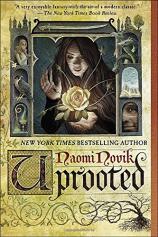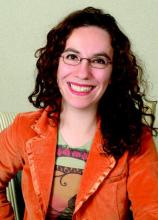Uprooted
Review
Uprooted
The folklore of Eastern Europe lurks somewhere in my ancestral past. A childhood book of Slavic fairy tales featured the witch Baba Yaga, who lived in the forest in a hut standing on stilts in the shape of chicken legs. And I inherited my grandmother’s antique silver creamer and sugar bowl, each balanced on three finely crafted --- what else? --- chicken legs.
Such unexpected and magical juxtapositions --- homely fowl and supernatural power, barnyard and dark wood --- also run through Naomi Novik’s marvelous new novel, UPROOTED. Its themes and geography are embedded in her personal history; the biography on the jacket flap says she was “raised on Polish fairy tales and stories of Baba Yaga.” Aha. Perhaps that’s why this book is so evocative and emotionally intense.
Novik is best known for the Temeraire novels, a prize-winning alternate-history series (eight brilliant volumes so far) that re-imagines the Napoleonic Wars fought with soldiers mounted on sentient dragons. UPROOTED, too, features a dragon --- but he is a man, albeit a powerful sorcerer; the Dragon is merely his magical soubriquet.
The setting is Polya, a country chronically at war with its neighbor, Rosya (Poland and Russia, get it?), and the Dragon lord --- terrifyingly rich, chilly and handsome --- lives in a mountaintop tower overlooking a pastoral valley. It is his task to protect it against the malign power of the Wood, a mysterious forest that contaminates crops, corrupts livestock and destroys souls. It is engulfing the villages, one by one. The whole valley will disappear unless he can stop it.
The story begins with a sort of lottery that resembles both Beauty and the Beast and The Hunger Games. Every 10 years, the Dragon chooses one girl of 17 from the valley. After a decade, the girl comes home briefly but never stays long before leaving for good. Maybe he seduces her, maybe he makes her his slave; certainly she emerges changed. Uprooted.
"On the whole, I found this novel both captivating and intelligent.... Novik has created a wonderfully rich, complex world described in radiant language that reminds me of another piece of my youth: an embroidered peasant blouse, glowing with color and intricate stitches."
Agnieszka, from the village of Dvernik, is an unlikely choice --- tall, awkward, skinny and untidy: “My only gift, if you could call it that, was that I would tear or stain or lose anything put on me between the hours of one day.” Her best friend, Kasia --- the local beauty, schooled to perfection in spinning, cooking and dancing --- is the obvious candidate. Yet Agnieszka is the one the Dragon selects.
At first it’s not clear why. In sequences reminiscent of Harry Potter or Ursula K. Le Guin’s Earthsea books, the Dragon attempts to train her in magic, yet even simple spells confined to traditional female activities (dressing properly or preparing an acceptable meal) seem beyond her. In time, though, Agnieszka demonstrates extraordinary talent for a different kind of magic, one he cannot quite fathom: She seems to pull spells out of nature itself. She can’t teach the Dragon how to replicate her sorcery, but they can weave enchantments together. And when they do, sexy scarcely begins to describe it.
Far from trying to seduce Agnieszka, the Dragon is distant, irritable and impatient with her --- all signs, as any romance-minded reader knows (think Mr. Rochester in JANE EYRE), that he is madly attracted. Their love affair progresses from spell-casting to kissing and finally…well, let us say only that UPROOTED doesn’t share the inhibitions of Young Adult fantasy.
But Agnieszka has little time for love. When her friend Kasia is seized by the Wood and imprisoned in one of its predatory heart-trees, she dashes off to save her and, with the Dragon’s help, brings her back to the tower. Kasia has been corrupted by captivity; it takes all their combined magical strength to exorcise the evil within her.
This is only the start of the struggle against the Wood. Novik’s dragon books have made her an expert at battle scenes, and the ones in UPROOTED, brimming with swordplay and spell craft, are both thrilling and tragic. Agnieszka’s eyes are opened to the pitilessness of life outside Dvernik. She is further disillusioned when she journeys to the capital city and encounters a different sort of violence: courtiers who play cruel games; obsessive, unscrupulous wizards.
The exception is an ancient witch named Alosha, who becomes her mentor. Those of their kind, Alosha explains, often live as long as 200 years; they must look beyond temporary concerns and private sorrows, fighting for the ultimate good of the kingdom. She and the Dragon have learned to live without attachments. Agnieszka has not. “I wouldn’t grow old,” she muses, sadly contemplating her future. “I’d just keep going, always the same, while everyone around me withered and fell away.”
There’s a lot more action to come --- possibly too much at times (this is my only criticism). Toward the end, I think UPROOTED gets a bit bogged down in the details of plot and history, causing the story to lose shape and this reader to lose concentration. It just feels too dense and complicated.
But that is a minor quibble. On the whole, I found this novel both captivating and intelligent. At its heart is the notion of nature as organic, magical, capable of reflecting the best and worst of humanity. The Wood symbolizes corrupted nature (is Novik making a comment here about our destruction of the planet?). Wizards and witches are go-betweens who mediate humans’ relation to their environment. Agnieszka can call down a thunderstorm, stir up an earthquake, heal a diseased tree, fashion a boat from a bundle of reeds, or conjure a cart and oxen from twigs and mud.
Novik has created a wonderfully rich, complex world described in radiant language that reminds me of another piece of my youth: an embroidered peasant blouse, glowing with color and intricate stitches. Here is Agnieszka’s description of her village: “I loved Dvernik, the deep soft woods around my house, the long bright running of the [River] Spindle beneath the sun. I loved the cup of the mountains around us, a sheltering wall. There was a peace deep in our village, in our valley…. It was home.”
But she is no longer a simple peasant lass. Agnieszka is a girl in transition, torn between her ordinary self and her magical self, village and tower, normal life and heroic exploits --- and, I suppose, between child and adult. Will coming into her power as a witch and a woman mean losing her roots? I can only hope that this plucky, endearing heroine will find a way to have both…in a sequel to UPROOTED.
Reviewed by Kathy Weissman on May 29, 2015





